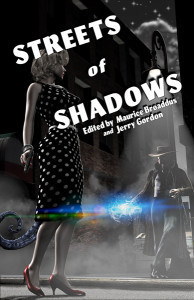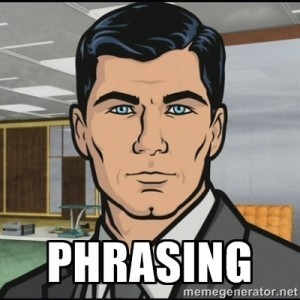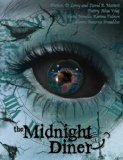Maurice Broaddus's Blog, page 21
June 30, 2014
Streets of Shadows – TOC Announcement
Coming soon to your favorite places to buy books … Streets of Shadows. Edited by Maurice Broaddus and Jerry Gordon.
“A Game of Cards” – A.C. Wise
“Shooting Aphrodite” – Gary Kloster
“Santa Muerte” – Lucy Snyder and Dan Robichaud
“Morrigan’s Girls” – Gerard Brennan
“Such Faces We Wear, Such Masks We Hide” – Damien Angelica Walters
“The Man Who Has Been Killing Kittens” – Douglas F. Warrick
“The Large Man” – Paul Tremblay
“Unfilial Child” – Laurie Tom
“Street Worm” – Nisi Shawl
“Der Kommissar’s In Town” – Nick Mamatas
“The Shadow People” – Brandon Massey
“Hand Fast” – Kristine Kathryn Rusch
“Beware of Dog” – Kevin J. Anderson
“Stay: A Tale of the Spellmason Chronicles” – Anton Strout
“God Needs Not the Future” – Jason Sizemore
“Relics” – Tim Lebbon
“Cold Fear” – Lucien Soulban
“In Vino Veritas” – Tim Waggoner and Michael West
“Best Served Cold” – Seanan McGuire
“Toby’s Closet” – Jonathan Maberry
June 29, 2014
I’m a Little Bi*
One month into being medicated, I didn’t notice a difference.
For those playing along at home, about two years ago, our marriage counselor suggested that I get checked out for possibly being bi-polar. Well, of course, rather than outright get checked out, I wrote a blog post about it and had a group wrestling session on the topic of writers struggling with mental issues as a theme for Mo*Con VIII (2013).
Once I got a day job with full health benefits, I eventually ran out of excuses to avoid my check-up. I was finally pushed over the edge to get checked out due to sleep and memory issues I was having. My penchant for only sleeping three to five hours a night I always considered a blessing which allowed me to get more stuff done during the day. However, the fact that I couldn’t remember what happened to me the previous week was a bit more problematic. Once the MRI revealed no organic cause, I was left with checking out mental causes. And yes, I went in every direction first before facing the possibility that I’d have to face the inevitable diagnosis.
It took longer for me to have a glass of Pepsi than it did for the psychiatrist to diagnose me: bi-polar with an extra dose of hypomania plus a side of free floating anxiety issues. Which meant that a conversation about medication needed to happen.
In my process of ducking being medicated doing my due diligence about possible implications for my writing/creativity, I talked to a lot of my friends, especially the ever-patient Lucy Snyder, Doug Warrick, and Jerry Gordon. Each of them have either struggled with similar conditions or had been in a relationship with someone who had.
My chief reason to put off being medicated involved some of the symptoms of hypomania: excess energy, feeling invulnerable, like you can take on anything (notice that I focused on the “positive” symptoms, not the ones which were hardest on those in close proximity to me). Which, practically speaking, meant that I had accepted a lot of projects and had a lot of looming deadlines. In other words, in my manic phase I had said yes to a lot of gigs, and to my thinking, I needed to stay manic in order to make all of my deadlines.
While this apparently made sense on paper, every single person I talked to (and I kept looking trying to find someone to agree with me) said the same thing: 1) yes, this sounds like it makes sense; 2) you may be able to pull this off, but you will always have/find some excuse to stay manic; 3) those closest to you will be the ones you’ll be grinding to make this happen; and 4) when the delicate balancing act goes off the rails, and it will, things may become … unmanageable.
By “kept looking” I mean I was going o talk to people until someone agreed with me. I then called Jim Hines. During Mo*Con VIII he told me to call him any time about any of this. He, too, agreed with everyone else. He also told me I would be the worst judge of not only my condition but also of how well medication would be working on me. He went onto say how I should have someone close to me (read: my wife, Sally) be the final arbiter on how well any medication is working.
So after promising him that I would quit conveniently missing all of my follow up appointments, stay on the meds for a least a month, and let Sally be the judge of the effects of the regimen, I went to see my doctor for medication. She started me on a low dose one, to alleviate my fears on the drug impacting my creativity; and two, to see if I’d even take it. Did I mention some of the symptoms of hypomania? Apparently few actually *want* to be treated for those symptoms.
I remember being resistant to the idea f even doing counseling. Again, by my reasoning, I wrote from a place of brokenness, it was the pain inside that I drew upon to write. I didn’t want to be “fixed” because it might mean an end to my stories. My counselor accepted that but countered with the idea that since being a writer was who I was, could I accept writing different stories (and, you know, find some healing along the way)? So I remain open to all of this.
On the practical/writing side of things, I’m adjusting my productivity expectations (accounting for the need to sleep like a normal person). I miss late nights. I miss not sleeping. I miss my bursts of crazed energy. Two months in, I didn’t notice a real difference. Though I admit I followed my wife around for the first three weeks asking “Am I better yet? Am I better yet? Am I better yet?”
Though one thing has been pretty telling: this mediation is crazy expensive. Even with insurance, we could easily pay a utility bill for what this stuff costs. With money being so tight, I volunteered to let the medication go in order to save money. My wife informed me that we’d make the budget work. Something must be different. So I guess we’ll keep this on-going experiment going. At least for a little while longer.
*
June 9, 2014
How to Train Your Dragon 2 – A Review
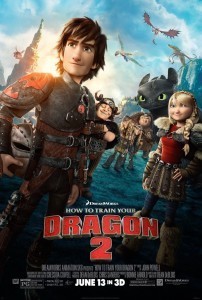 Like every other studio, DreamWorks Animation felt the pressure to do a sequel of a monster hit that would at least match and hopefully outshine its original (with a gross of anything less than hitting the half billion mark being seen as a failure). Brought to the table was writer/director Dean DeBlois to take on Cressida Cowell’s YA book series, How to Train Your Dragon 2 should easily clear any such bar.
Like every other studio, DreamWorks Animation felt the pressure to do a sequel of a monster hit that would at least match and hopefully outshine its original (with a gross of anything less than hitting the half billion mark being seen as a failure). Brought to the table was writer/director Dean DeBlois to take on Cressida Cowell’s YA book series, How to Train Your Dragon 2 should easily clear any such bar.
“No task is too small when it comes to serving your people.” – Stoick
Set five years after the previous movie, with, in a rare turn for an animated movie, all of the protagonists realistically aged, our hero Hiccup (Jay Baruchel) aims to entirely skip any awkward phase and move straight to handsome young adult. His father, Stoick (Gerard Butler) still attempts to mold him into the proper successor, well, his idea of the proper successor to run their now dragon sanctuary village, Berk.
Hiccup still follows his heart, often leaving the village to follow his fancy on his faithful dragon, Toothless. Despite capturing the spirit of a boy and his horse, Toothless still comes across as somewhere between between a cat and a big puppy.
Hiccup still has his circle of friends–Snotlout (Jonah Hill), Fishlegs (Christopher Mintz-Plasse), Tuffnutt (T.J. Miller) and twin sister Ruffnut (Kristen Wiig)–and most notably his girlfriend Astrid (America Ferrera). But the movie, despite the bookend sequences featuring them in a dragon race, quickly moves away from any obvious romp featuring them.
“Men who kill without reason cannot be reasoned with.” – Stoick
Instead Hiccup and Astrid are drawn into a mystery involving a heretofore unknown dragon species as well as a madman who seeks to control the alpha of the species (since he who controls the alpha controls all dragons). Drago Bludvist (Djimon Hounsou) is a simpler brand of villain: dragons + him = crushing all enemies.
However, complicating the story is the presence of Valka (Cate Blanchett) the dragon whisperer/Jane Goodall of the dragon set, and the polar opposite of Drago. She protects a true dragon sanctuary, the only human allowed to know of its existence much less live among them for nearly two decades. Thus paving the way for her role as Yoda training young Hiccup in the way of the dragon.
Between the natural tension between Hiccup and Stoick, the ease of Astrid and Hiccup, the gentle fondness among the circle of friends, the revelation of Valka, at the heart of the movie is the sense of family. This backdrop makes the conflict and its repercussions that much more powerful. The great thing about How to Train Your Dragon, either edition, is that it both respects and challenges its audience. This time around, the movie commits to deeper themes allowed by its cast being older. There is real loss and consequence to actions harkening back to any of a number of Disney movies like Bambi and The Lion King, while taking it to mythic levels.
“People are not capable of change.” – Valka
Whereas Hiccup was the moral compass in the first movie, here he is drifting in a way. He doesn’t know who he is, part of him searching for a sense of his identity. Even Toothless is searching for another Night Fury, rather than facing the possibility that he may be the last of his kind. So much of our identity is grounded in the reflection of our parents. Hiccup didn’t know his mother and can’t live up or into his father’s expectations.
We often have a distorted image of ourselves. Like Hiccup, afraid to become his father because he never thought he could. Believing instead various lies, like he was neither the chief his dad wanted him to be nor the peacekeeper he thought he was. Instead, we need to remember who we are and who we were created to be, and embracing our giftings. Only then can we echo Hiccup’s journey to his true self, and realize he has the heart of a chief and the soul of the dragon.
“This is who you are, son.” – Valka
How to Train Your Dragon 2 manages to reinvigorate the franchise by expanding the world and deepening the mythology. To call the animation visually dazzling, majestic, and lush (with a deft use of 3-D) almost seems too obvious. Almost like saying that this is a great sequel and a great movie.
May 23, 2014
Launch Party: KING MAKER by Maurice Broaddus
King Maker is now available as an audio book on Audible.com. On one level, it throws me off when I hear people reading my work and repeating those words out loud. I wrote those words that someone is reading and performing. *I* did that. THEY are *reading* them! And as excited as I was when I stumbled across Mark reading the prologue from King Maker:
(by the way, here’s Mark Reads King Maker Prologue Part 2), I’m doubly excited to announce that King Maker is now available on Audible.com.
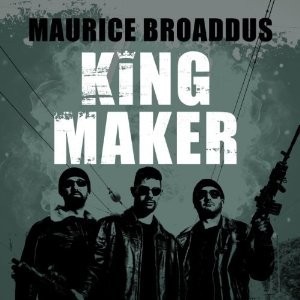 I wanted to retell the legend of King Arthur in a completely new context. Told through the eyes of homeless teens, drug dealers, and gang members, I also wanted to explore the idea that we, even cities, have shadows. So on one level, it’s what makes it easy to “believe” that there is this magical underbelly to our everyday reality. One that’s always there yet we never both to look for it or acknowledge it, filled with plant elementals, senile mages, trolls, fairies, and all manner of beasties. At the same time, this magical shadow city serves as a kind of metaphor for another kind of shadow. A very real world one: homelessness.
I wanted to retell the legend of King Arthur in a completely new context. Told through the eyes of homeless teens, drug dealers, and gang members, I also wanted to explore the idea that we, even cities, have shadows. So on one level, it’s what makes it easy to “believe” that there is this magical underbelly to our everyday reality. One that’s always there yet we never both to look for it or acknowledge it, filled with plant elementals, senile mages, trolls, fairies, and all manner of beasties. At the same time, this magical shadow city serves as a kind of metaphor for another kind of shadow. A very real world one: homelessness.
With King Maker we are introduced to a world of outsiders, people who are typically “voiceless” in our society: the homeless, drug addicts, gang members, prisoners, and the poor. The powerless, the invisible, the “least of these” … and we peek into their world, see their faces, and hear their stories. Sometimes through poor choices, sometimes due to circumstances beyond their control, they struggle to maintain their dignity, humanity, lives. As they face fear, loss, spiritual hardships, and their very survival, King rises up.
So here’s King Maker. Coming soon are King’s Justice and King’s War. I’ll invite you to those parties, too.
May 22, 2014
Midnight Diner 5.2: A Hole of Social Media
My column for the second issue of The Midnight Diner (issue 5.2) is available. Here’s the opener:
A Hole of Social Media
I. Digging a hole
Social media can be a tricky landmine field. For example, take a tale of two friends. One friend writes a well-intended blog, it gets taken wrong, and the conversation goes in all sorts of unintended places. Another opines in the heat of passion in a blog post, Facebook status, magazine column as if they are just talking to their buddies and not living in the age of the Internet. In either case, social media becomes the wild west, where anyone can see and jump into a conversation, and before long drama is up and running. In either case, it’s easy for words to come tripping out of people’s mouths or off their fingertips in keyboard fury, ahead of their brains. Social media captures a snapshot of people, sometimes leaving them exposed as … in a hole.
May 21, 2014
X-Men: Days of Future Past – A Review
Endless Days of Future Paradoxes
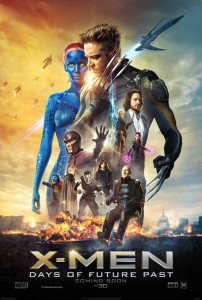 A true sense of reverence to the X-Men history buoys this entry into the franchise. It helps that this comes on the heels of the terrific X-Men: First Class as well as the surprisingly good, The Wolverine. The Days of Future Past screenplay, by writer-producer Simon Kinberg, from a story by Jane Goldman, Kinberg and Vaughn, takes its name for a two part story *way* back in Uncanny X-Men 141-142, where we get to see a possible future timeline where the sentinels have run amuck. [This would eventually lead to a convoluted history to the franchise (with the way time travel stories working, that timeline was both averted and still exists because … yeah).] Hardcore comics followers also get to see Wolverine before he gets his adamantium skeleton, touching on yet another major comic’s storyline.
A true sense of reverence to the X-Men history buoys this entry into the franchise. It helps that this comes on the heels of the terrific X-Men: First Class as well as the surprisingly good, The Wolverine. The Days of Future Past screenplay, by writer-producer Simon Kinberg, from a story by Jane Goldman, Kinberg and Vaughn, takes its name for a two part story *way* back in Uncanny X-Men 141-142, where we get to see a possible future timeline where the sentinels have run amuck. [This would eventually lead to a convoluted history to the franchise (with the way time travel stories working, that timeline was both averted and still exists because … yeah).] Hardcore comics followers also get to see Wolverine before he gets his adamantium skeleton, touching on yet another major comic’s storyline.
All of this may point to the fact that Bryan Singer seems to not only “get” the X-Men but truly loves them. His absence was felt during the third X-Men movie, whose director obviously DID NOT get or love the characters while at the same time, Singer didn’t seem to have as strong a connection to the Superman canon.
“What if this is who she is?” –Hank/Beast
Opening with a sequence reminiscent of Magneto’s experience with the Holocaust, a group of renegade mutants, including Professor X (Patrick Stewart), Magneto (Ian McKellen), Wolverine (Hugh Jackman) and Storm (Halle Berry), hide from robot hunter/exterminators, Sentinels. A future Kitty Pryde uses her (just cause) consciousness transference powers to send a future Wolverine back along his own timeline in order to prevent Mystique (Jennifer Lawrence) from killing Dr. Bolivar Trask (Peter Dinklage), creator of the Sentinels. However, it’s her capture and subsequently extrapolated DNA which creates the next gen power adapting Sentinels which go on to wipe out mutants and humans alike in the future.
In the unfamiliar role of voice of reason and mentor, Wolverine is tasked with putting the band back together, getting a past disillusioned and strung out Professor X and a past tormented and angry Magneto to work as a team, bolstered by the Beast (Nicholas Hoult). The script manages to wring out more than its share of laughs along the way. A big part of this includes a spectacular scene where Peter Maximoff, aka Quicksilver (a character who gets to be in both the X-Men and Avengers franchises, though without cross-referencing) helps break Magneto out of his cell under the Pentagon. Too bad he isn’t in the film more.
“Just because someone stumbles and loses their way doesn’t mean they are lost forever.” –Professor X
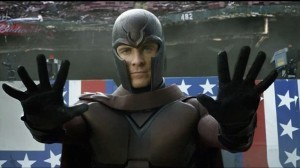 X-Men: Days of Future Past demonstrates an emotional depth rarely seen since the temptation of super hero stories is to go for maximum action. The movie revolves around relationships and redemption. The relationship between Magneto and Professor X; Professor X and Mystique; Mystique and Magneto. At its core is characters working through how to define themselves: Professor X, the only character who gets to confront his younger self; Mystique (if she is to be the woman Professor X imagined her to be or the one Magneto hopes to mold her into) and Magneto (who has to struggle against the demons of his past which fuel his sense of mission). And the stakes are huge: their choices essentially determining the fate of human and mutantkind.
X-Men: Days of Future Past demonstrates an emotional depth rarely seen since the temptation of super hero stories is to go for maximum action. The movie revolves around relationships and redemption. The relationship between Magneto and Professor X; Professor X and Mystique; Mystique and Magneto. At its core is characters working through how to define themselves: Professor X, the only character who gets to confront his younger self; Mystique (if she is to be the woman Professor X imagined her to be or the one Magneto hopes to mold her into) and Magneto (who has to struggle against the demons of his past which fuel his sense of mission). And the stakes are huge: their choices essentially determining the fate of human and mutantkind.
“We give you a second chance to define who you are.” –Professor X
A human being is defined by who loves them. They can be defined by the pain of their past or be defined by the loved of God. They can find their identity in lies and self-deception or find their self-worth in truth. Magneto and Mystique each come to their own moment of crisis, a crossroads point, and have a decision to make as far as who they are going to be and how they are going to live.
Brokenness can be redeemed. Finding redemption means washing their own wounds and past, giving up those histories of hurts, and letting go of them. It means finding forgiveness, for themselves as well as others. In so doing, their wounds might become occasions for new visions. Real love risks and offers redemption and when loved well, we’re taught about God.
“You can show them a better path.” –Professor X
The thing about time travel/alternate future stories is sort of like watching alternate universe scenarios play out (or reading Marvel Comics’ What If …? Series): we’re allowed to experience the shock and pain of our heroes suffering/dying without the actual consequences to their canon (I know, I know, we’re still talking about comics’ canon where no one truly dies for long).
The other thing about time travel stories is that most times they breakdown if you think about them too hard. We have to pretty much accept the “just cause” rule of time travel as to why any action occurs in the future once Wolverine gets sent into the past to change said future (but “just cause” we want to see more Bishop and Blink in action works).
By the time the movie is done, it essentially gets to reset continuity (so only Wolverine has to remember the third X-Men movie). For everyone else, next up is X-Men: Apocalypse.
May 18, 2014
A Wedding Toast
Two dear friends of mine (and Mo*Con mainstays!) were recently married and I was asked to give a toast at their reception. Unfortunately, I was way-laid by a stomach bug/food poisoning (it was quite the toss up, literally and figuratively, considering what I was eating before I got sick), and wasn’t able to make their reception. Since I wasn’t able to make it, and because I told her I would, I thought I’d post here what I would have said:
A Toast
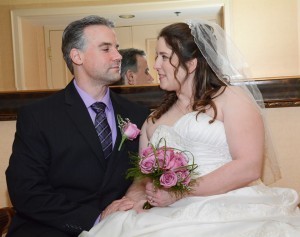 For those who don’t know me, my name is Maurice Broaddus. I’m a horror and fantasy writer. I even started an annual writers’ convention and named it after myself, Mo*Con, because, well, I like me a lot. Now one of the things I’ve always said about Mo*Con is that it’s about relationships. As much as I’m here to toast the happy couple, I want to talk to you about how this relationship has affected me.
For those who don’t know me, my name is Maurice Broaddus. I’m a horror and fantasy writer. I even started an annual writers’ convention and named it after myself, Mo*Con, because, well, I like me a lot. Now one of the things I’ve always said about Mo*Con is that it’s about relationships. As much as I’m here to toast the happy couple, I want to talk to you about how this relationship has affected me.
Like I said, I’m a horror writer, I write books, so you can imagine how Rhonda and I first met. Now Rhonda loves several things: she loves horror, she loves books, and she loves being in relationship. Now Rhonda and I’s relationship has grown and changed over the years. She’s gone from fangirl to friend.
I don’t think you quite get the totality of the transformation of this relationship. I went from esteemed author, the guy she was nervous to even engage in a conversation, the guy worthy of fan adoration to … her girlfriend.
I no longer got to hear about how great my stories were, I got to hear about diets and outfits and, worst of all, boy troubles. Oh Lord, she was a walking train wreck of dating calamity. Non-stop complaints about her dating troubles.
All of which stopped when she met Craig.
I hadn’t met Craig, but I knew all about Craig long before I met him. My one big take away about Craig: Rhonda didn’t have to worry about “boy troubles” anymore. Rhonda had to get used to the idea of having a man in her life who cared about her, wanted to be with her, appreciated her just the way she was.
I learned something else about Craig the first time I got to meet at a Mo*Con. All of you who don’t know him that well should try this too: he loves it when a total stranger gives him a hug. A long unflinching hug where all you’re doing is saying “Thank you, thank you, thank you.”
As we’re invited into people’s lives, we’ve had the privilege to watch relationships start and blossom. I’ve had that privilege with Rhonda and Craig. I’m sure you agree, these are two special people who have found each other. And we’re honored to share this time, this moment, with them.
To Rhonda and Craig.
May 15, 2014
Launch Party: HADES’ DISCIPLES by Michael West
Michael West is two books into his Legacy of the Gods series through Seventh Star Press. He’s still feeling the effects of Mo*Con, but he invites us to the launch of his latest, Hade’s Disciples.
Lessons Learned at Mo*Con: Hades’ Disciples by Michael West
Last week, I had the great pleasure of attending Mo*Con 9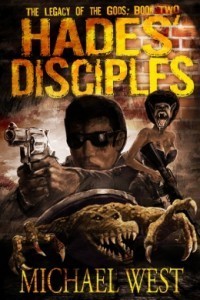 . In fact, I’ve attended every Mo*Con, and while each one has been a festival of sorts, bringing together friends and peers from the wide world of publishing and art for a weekend-long party, the topics addressed and the issues discussed are weighty ones indeed: race, sex, discrimination, sexual orientation, God, religion, mental health, marriage, relationships, feeling like an outsider to normal society, how our views on it all color the way we see the world and interact with one another, and of course, how all of this affects what we read and what we write.
. In fact, I’ve attended every Mo*Con, and while each one has been a festival of sorts, bringing together friends and peers from the wide world of publishing and art for a weekend-long party, the topics addressed and the issues discussed are weighty ones indeed: race, sex, discrimination, sexual orientation, God, religion, mental health, marriage, relationships, feeling like an outsider to normal society, how our views on it all color the way we see the world and interact with one another, and of course, how all of this affects what we read and what we write.
The long days—and very late nights—of Mo*Con, like most conventions I attend throughout the year, leaves me feeling drained afterward, but also quite energized. Being around so many artistic people, you can’t help but get your creative batteries charged. And those charged batteries often power new and amazing projects.
For me, one of those projects has been my dark Urban Fantasy series; The Legacy of the Gods, which began in 2012 with the publication of Poseidon’s Children, and continues now with the release of my new novel, Hades’ Disciples.
In Hades’, terrifying creatures exist all around us, hiding in plain sight. Ancient. Deadly. They gather in secret, conspiring, dreaming of nothing less than humanity’s destruction, and their numbers are growing. Earl Preston knows the danger all too well. After tangling with a horde of mythological sea monsters in Colonial Bay, he has been tasked with finding these beasts and exposing their plans whatever they may be. But Earl is not the only one with a mystery on their hands. At the very top of the world, Carol Miyagi has stumbled onto an artifact from Earth’s past, something magnificent held captive in a prison of ice and snow. Now, Carol and Earl must work quickly to decipher the will of the gods–a plot that defies imagination–and to stop their followers from carrying it out.
Earl is African-American, struggling to do what’s right and to make his father proud. Carol is Asian-American, raised in both the United States and Japan, and yet not feeling a real connection to either culture. There are other major characters too, none of whom fit comfortably into any typical mold. They are people who are outsiders to mainstream society, people who are uncomfortable in their own skins, and people who struggle with their own faith and sanity. Basically, they’re the sort of people who would fit right in on your average Mo*Con panel.
The panels at Mo*Con are all about finding common ground, about breaking down the walls of ignorance and uncertainty that divide us. The characters in my Legacy novels must learn to work together, despite their various differences, in order to save the world. Wouldn’t it be wonderful if we could all do the same?
Signed, Limited Edition Hardcovers of The Legacy of the Gods Book Two: Hades Disciples are now available for pre-order through Seventh Star Press. There are also a few copies still available for Book One: Poseidon’s Children, which you can add to your order for no additional shipping and handling.
#
Website: http://www.bymichaelwest.com
Amazon store: http://www.amazon.com/Michael-West/e/B007QD125G/ref=ntt_dp_epwbk_0
Facebook: http://www.facebook.com/bymichaelwestpage
Twitter: http://www.twitter.com/bymichaelwest
May 14, 2014
Midnight Diner 5.1: Writing the Other? Check Your Privilege
Oh, did I mention that I have been writing a column for the newly re-launched Midnight Diner? Editor-in-Chief, Michelle Pendergrass, approached me to do the articles, which in turn has sort of sparked me doing more on my blog. SOOOOO, you have her to blame. Here’s the opening of the first column:
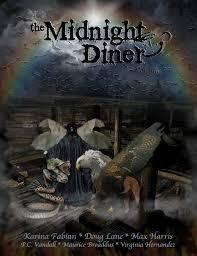 Writing the Other? Check Your Privilege
Writing the Other? Check Your Privilege
Welcome to my inaugural column here at the Midnight Diner. I suppose some measure of introduction is in order to give you a head’s up on what you’re in for. On my blog and in my stories, I like to regularly explore non-controversial topics, such as race, religion, politics, and class. I have a story in the latest issue of Asimov’s SF. “Steppin’ Razor,” a steamfunk tale with a re-imagined Jamaica as a superpower, England ruling the world (including the American colonies), robots, Rastafarians, assassins, and the clone of Haille Selassie, and the fact that, as one reviewer noted, “there are no white characters in the story.”
I’ve perused a handful of other reviews and you might be surprised to find out that there are no notes concerning the lack of black or non-white characters in other stories.
Should I await the lecture on writing the other?
(continued in the Midnight Diner 5.1 available on Amazon now)
May 12, 2014
MoCon ReCap – Outsiders: Being, Living, and Writing the Other
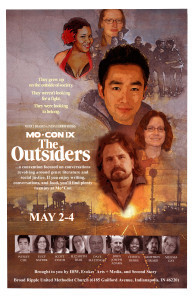 The topic of writing the other has been on my heart a lot lately. Obviously a topic near and dear to me going back to the days of RaceFail ’09. As writers, we constantly face the challenge of writing the other. And we have a certain amount of trepidation because we don’t want to get it wrong. Maybe it’s just me. Whenever I’m writing outside of me—which basically means this blog—I’m writing the other.
The topic of writing the other has been on my heart a lot lately. Obviously a topic near and dear to me going back to the days of RaceFail ’09. As writers, we constantly face the challenge of writing the other. And we have a certain amount of trepidation because we don’t want to get it wrong. Maybe it’s just me. Whenever I’m writing outside of me—which basically means this blog—I’m writing the other.
I was born in London, England and moved to (Franklin and then) Indianapolis, Indiana. My accent alone put me on the outside, much less the fact that a desegregation program of my school had me on a track where I was the only black student in most of my classes. So despite my father being U.S. born African American, my mother being Jamaican, I always felt cultural lost, and on the outside. Probably the reason why the quest for identity plays such a prominent theme in many of my stories. When I approach the blank page, however, I consider myself an invited outsider.
Every time I have to do the work of a writer:
-avoid clichés
-create well-rounded characters with fully formed histories
-take into account their worldview
-realize how they are perceived, be mindful of the power imbalance between cultures
-get the dialogue right
All of this comes with the acknowledgement that I will probably screw things up. In my urban fantasy series, The Knights of Breton Court, I worried about being a poverty pimp. I re-tell the legend of King Arthur though the eyes of homeless teens, drug dealers, and gang members. I could be criticized for such a portrayal of black people, as if that’s the only story black people have to offer. While that was the story I wanted to tell, I don’t want to add to the cultural depiction of my people. It’s probably one of the reasons my next stories involved high level Jamaican political intrigue (“Steppin’ Razor”) and middle class citizens struggling against a corrupt system (“Pimp My Airship”).* My goal: fail better the next time.
Of course, I wonder if we will allow each other the grace to make mistakes and forgiveness during the course of the conversations that WILL come. Otherwise writers may be paralyzed by the possibility of making a mistake and the Internet falling on their heads. Wanting to write beyond “what they know,” who they are as well as their “tribe”; but stretching for inclusivity while not wanting to appropriate, not wanting to marginalize, not wanting to cause more harm in their wake.
Conversations swirl about the desire for greater diversity continue to occur. We want to encourage it among our editors (although, reaching out to writers you want to work with to create diverse anthologies isn’t exactly rocket science) and how to do it well (Nisi Shawl/Cynthia Ward and Mary Anne Mohanraj have some good thoughts).
On the flip side, I also say “be fearless.” Writing is risk, defying conventions, speaking truth to power, challenging thought, is part of the role of the artist. Take chances, do your job as writers, and when we screw up, next time fail better.
*Plus I got tired of editors asking me to write stories for their anthologies doing “that urban thing you do”

